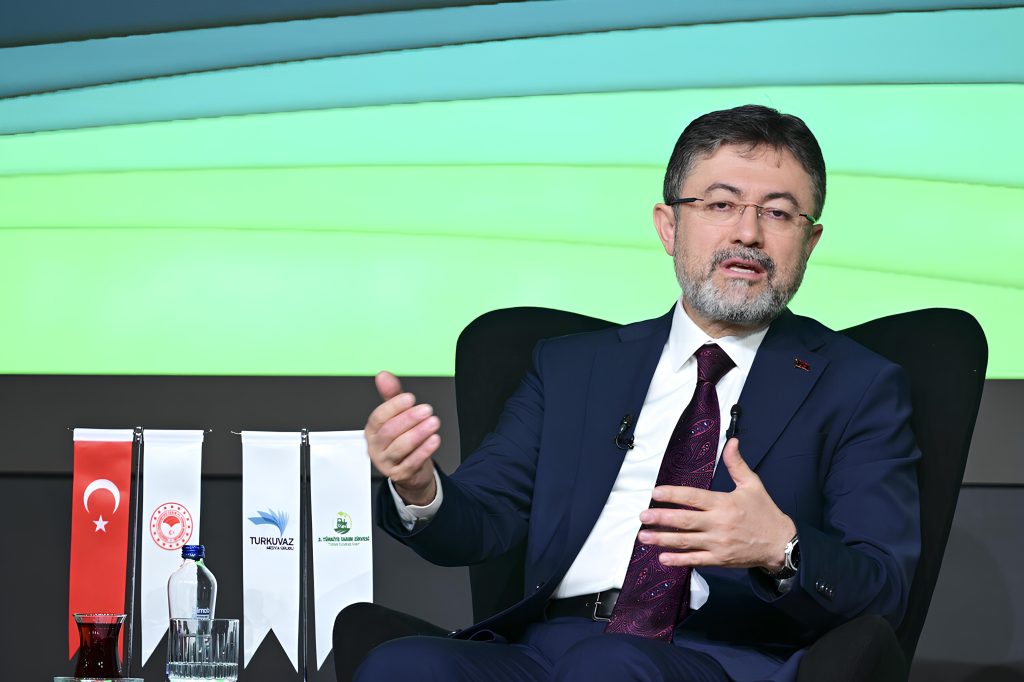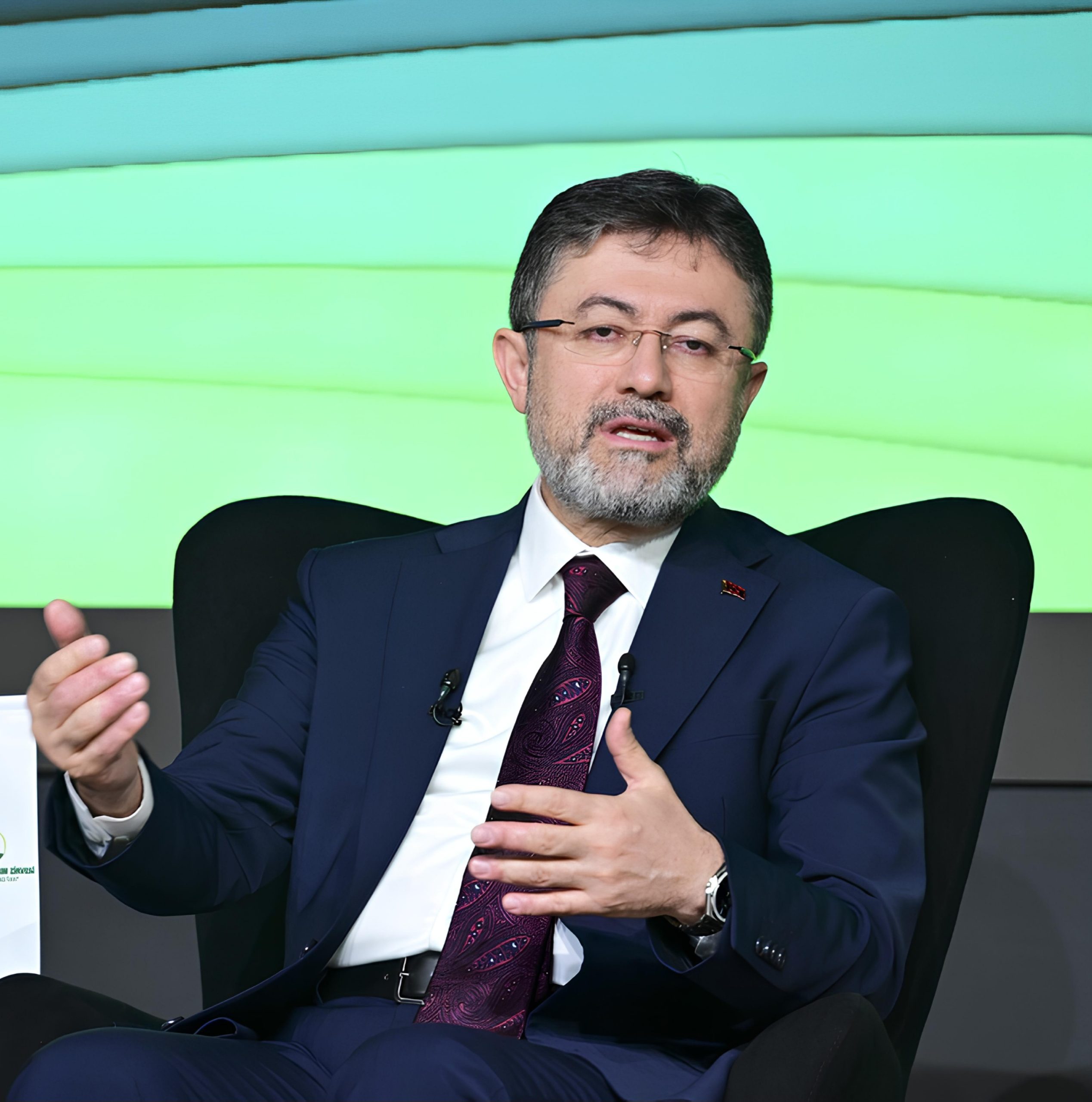
Yumaklı’s speech highlights Türkiye’s water security amid climate change, urging national cooperation and mobilization for sustainable solutions.
December 10, 2023

Addressing the increasing importance and impact of environmental problems worldwide, particularly at national and international levels, highlights the visibility of climate change. The primary cause of climate change is the escalating greenhouse gas emissions resulting from human activities. The consistent upward trend in these emissions has turned climate change into a global problem that has captured the attention of national policymakers, international institutions such as the United Nations, the European Union, NATO, and various non-governmental organizations (NGOs) in recent years. In this context, this article focuses on how policymakers in Türkiye address the phenomenon of climate change. To achieve this, the speech delivered by İbrahim Yumaklı, the Minister of Agriculture and Forestry of the Republic of Türkiye, at the Water Efficiency Mobilization Information Meeting organized by the Presidency of the Republic of Türkiye will be analyzed using discourse analysis. The examination will specifically look into how the concept of climate change is handled.
Securitization is a concept that emerged as a critique of the classical state-centered and military measure-oriented understanding of security presented by the Copenhagen School. It has been a crucial component of the expansion and deepening of the International Relations discipline. According to the constructivist approach of security-building theory, for certain problems to become a security issue, the political authority must define that issue as a security problem. Policymakers execute this process through the speech act. Put more clearly, by defining an issue as a security problem, the political authority can elevate it to a level where extraordinary measures can be taken outside the classical political agenda. More importantly, this allows the political authority to legitimize the measures to be taken against the issue in question. This approach is generally observed in issues such as terrorism and migration.
Climate change is a concept that emerged under the umbrella of environmental degradation following rapid industrialization and two major world wars. Environmental degradation, caused by the increase in greenhouse gases due to the rising use of fossil fuels such as oil, coal, and natural gas by large populations, accelerates climate change. This situation disrupts the existing balance in nature and renders the interdependence between human and climate perilous. In other words, humans, who impact the climate, are also affected by the deteriorating climate. Various examples of climate change, such as forest fires, drought, desertification, extreme weather events, storms, and rising sea levels, pose significant dangers to human life. From this perspective, the impacts of climate change on humans and society have started to be evaluated within the scope of the security approach. People are expected to be directly affected by air pollution and thirst, and indirectly by triggering conflicts between societies due to the depletion of limited resources. For these reasons, the role of policies and policymakers in the issue of man-made climate change is quite significant.
Recently, it has been observed that some policymakers in Türkiye have resorted to securitizing discourses on environmental issues and climate change. In this context, the discourses of Minister of Agriculture and Forestry İbrahim Yumaklı, who made important statements at the Water Efficiency Mobilization meeting held in Istanbul on November 17, 2023, on the issue of water, which is addressed within the scope of climate change, were analyzed. The content of the analyzed speech is as follows:
“Lake Aral has shrunk by 90% of its previous size in the last 50 years. In our country, Lake Akşehir has lost two-thirds of its current water surface between 2020 and 2022. According to calculations based on the water potential of our country, the annual amount of water per capita is 1,313 cubic meters. I would like to draw your attention to the fact that this is the maximum amount per capita that we can use, not the amount we use. This value is an indicator that shows our country underwater stress according to international indicators. At this rate, it is possible that in 2030, only 6 years from now, this ratio will fall below 1,000 cubic meters and our country will fall into the category of countries suffering from water scarcity. It is also possible that after 6 years, half of our population and 80% of irrigated agricultural areas will face the danger of water shortage. Contrary to what has been known so far in our unique geography that harbors ancient riches, our water resources have become limited. In 2030, we predict that our country’s population will increase by 10%, and water resources will decrease by 20%. Dear members of the press, we can manage these threats for our future with social consensus before they turn into crises. This is a historical responsibility for all of us. We must deliver the green and blue that we are entrusted with today to our children.
In this context, we launched the water efficiency mobilization on January 31, 2023, under the auspices of the esteemed Emine Erdoğan. Unfortunately, six days later, we experienced the disaster of the century and had to postpone our work for a while. Today, we remind the water efficiency mobilization again and accelerate our cooperation with our 85,000,000 stakeholders. Dear members of the press, the water efficiency approach is to give due importance and respect to water, which is the source of our lives. We aim to make water efficiency both a national policy and a culture of life. Within the scope of the mobilization, we have targets for urban, agricultural, industrial, and individual water use. Our aim is to prevent water scarcity by joining hands. In this direction, we have accepted the water efficiency mobilization as a milestone. We have published our water efficiency strategy document and action plan covering the next 10 years. In this document, we have targets, strategies, and actions for urban, agricultural, industrial, and individual uses.
We continue our work in coordination with our cooperating institutions. I would like to share some of these with you. The process of establishing water efficiency units in our public institutions has started. To reduce water loss rates in drinking water systems, the practice of municipal water brotherhood was initiated. The total potential in our country for the reuse of used water was determined. Efforts are underway to popularize the practice. Guidance documents were prepared for the efficient use of water in the industry. In particular, we are carrying out activities to support the Green Organized Industrial Zone practice. We continue to provide 50% grant support to farmers for the use of efficient irrigation systems. We continue our efforts and investments to increase the rate of pressurized irrigation systems by 33%. Type projects for rainwater harvesting and gray water applications were prepared and shared with all sectors. We are increasing our facilities such as dams, ponds, and underground storage. To raise awareness in all segments of society, we have started and continue to carry out training activities. Likewise, we revised our agricultural law to put water at the center. We established a national water board to coordinate all relevant parties in water management. We are working on a water law that will secure our water resources in terms of quality and quantity and strengthen water management. We are also working on a flood law that will increase our resilience against flood disasters. Dear members of the press, while these works are ongoing, we expect our municipalities to reduce water losses, to use alternative water resources such as gray water, rainwater, and treated wastewater, our farmers to produce their crops with modern irrigation systems in times of low evaporation, our industrialists to use water-efficient techniques and technologies and our citizens to be more sensitive in their daily water use habits.
Members of the press, the meetings we started with you today to bring our water efficiency mobilization back to the public agenda will continue. We will organize a water summit where we will evaluate the issue with all our stakeholders in every dimension, where we will also have the opportunity to discuss and see what stage the past practices are at. We will meet with young people in our universities and involve the managers of the future in the process. We will also meet with our non-governmental organizations and ensure that they take an active role. Together with our teachers, we will raise awareness of our children, the guarantee of our future. Of course, this is not a one-off or a set of practices covering a certain period. Therefore, dear members of the press, we have a call to our dear citizens whom we reach through you; it is time to take action. Let’s manage the risk together before it turns into a disaster. In this mobilization, we say “be a drop of water”. I invite everyone, all segments of society, all groups, all layers, all sectors, that is, everyone who makes up Türkiye, to share a common concern and contribution for our water resources and to join hands for our water and our future.
The analysis of the transcribed speech reveals that Minister Yumaklı’s discourse was characterized by themes such as threat, danger, risk, and cooperation. It was determined that the concepts of cooperation, mobilization, and social consensus were emphasized against the mentioned risks and dangers. In particular, attention is drawn to the scarcity that may arise if the current situation in water use continues. In this sense, the emphasis on large denominators such as “half of the population” and “80% of irrigated agricultural areas”, which are said to be affected by the scarcity that will arise, shows the gravity of the expected situation and the size of the impact area.
The association of this threat and danger with water scarcity implies that the issue is securitized. From a securitization perspective, identifying and controlling the existing risk are important aspects of security. However, at this point, Minister Yumaklı’s statements call for social consensus, i.e., cooperation, to prevent the water problem that emerged as a result of the climate crisis from turning into a disaster. Following the acknowledgment of the threat, the Minister also addresses the concept of “mobilization”, referring to the necessity of collective action in emergencies.
The speech also emphasized that this mobilization was initiated by Emine Erdoğan. Announcing the mobilization through a well-known person in the country is important for the initiative to be heard by the masses and to increase participation in the mobilization. Thus, the concept of mobilization can play a role in the securitization of environmental problems or water problems discussed in the meeting and can be considered as a strategy for social security. In this sense, the emphasis on “85,000,000 stakeholders” shares the expectation that the planned strategy will be carried out with the participation of citizens.
The increased emphasis on cooperation points to national mobilization for water efficiency mobilization. Examining the water issue at the national level and putting it into practice through long-term strategic plans implies that water problems that are treated as threats are linked to security. In the event of a risk turning into a disaster, public security is envisioned to be threatened, and risk management strategies are adopted to prevent it.
In conclusion, the phenomenon of Climate Change, caused by many human-induced factors, is a problem that states, NGOs, institutes, and individuals should pay attention to and try to find solutions for. From the analysis of Yumaklı’s speech, it is clear that Türkiye is one of the countries affected by climate change and will be affected even more in the future, and this situation has been realized by policymakers in Türkiye. Finally, it is observed that the water problem in Türkiye is securitized in the context of climate change, but there is a call for cooperation for a solution. In this sense, security protocols should be revised, emergency action plans should be created, and measures should be taken in international cooperation for the water problem, which is one of the consequences of climate change. Moreover, the negative consequences of climate change will not only be ecological. Migration, shortage, terrorism, and severe economic problems will emerge in the countries most affected by this problem. Therefore, global and local impacts of the problem should be analyzed, and multidimensional solution mechanisms should be put into practice.
A curated seletion of FA’s must-read stories.
Written By: DILARA SAHIN
Written By: RIZWAN RAFI TOGOO
Written By: ERIC SONG
Written By: BATUHAN GUNES
Written By: E. ERDEN
Written By: SHOHREH POOLAB
Written By: ALEYNA TASTAN
Written By: CIHAN KAAN GAZI
Written By: ABDURRAHMAN ADIGUZEL
Written By: BEYZANUR SARICICEK
Written By: SELIN ARDIC
Written By: NILAY CELIK
Written By: ELDANIZ GUSSEINOV
Written By: JOSEF SCHOEFL
Written By: SINEM UNALDILAR
Written By: FATIH CEYLAN
FA’s flagship evening newsletter guilding you through the most important world streis ofthe day. Delivered weekdays.
